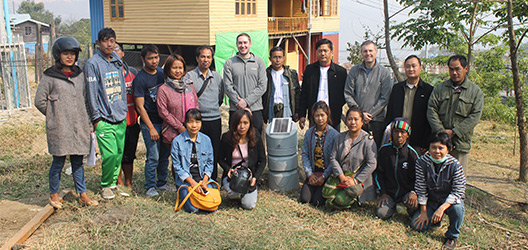26 Mar 2018
Academics install early-warning landslide technology in Myanmar
Two Loughborough academics have installed technology in Myanmar that could revolutionise landslide monitoring and protect vulnerable communities.
Professor Neil Dixon and Dr Alister Smith, of the School of Architecture, Building and Civil Engineering, hope by putting Community Slope SAFE (CSS) in Hakha, Chin State, the number of landslide-related deaths will be reduced.
The pair installed the equipment with the help of project funders FHI 360 and local partner Chin Committee for Emergency Response and Rehabilitation (CCERR) and have met with Minister of Social Affairs for Chin State Pu Pau Lun Min Thang to discuss their work.
They are now training CCERR youth volunteers to use the system which works by ‘listening’ to slope displacements.
CSS was developed by Professor Dixon, Dr Smith and Dr James Flint, of the School of Mechanical, Electrical and Manufacturing Engineering, with Enterprise support including funding, and was highly commended in the University’s 2017 Enterprise Awards.
The system detects the onset of a landslide and communicates wirelessly with a base station located in the community, alerting them to the danger.
Landslides have resulted in more than 30,000 fatalities over the last decade – predominately in South East Asia and Central and South America. It is hoped CSS can help save lives by providing valuable time to evacuate.
The innovative sensor system – which is easy to install and operate – has performed well in laboratory tests and project partner Datalink Electronics is developing the design to support high-volume, low-cost production.
The technology has undergone field trials with collaborators Universiti Sains Malaysia, JKR, Slopewatch and NGO FHI 360. Further trial opportunities are being pursued in Nepal and Brazil.
Professor Dixon previously commented: “Many landslides are caused by heavy rainfall events and this causes thousands of people to be killed and huge damage to infrastructure.
“Technologies exist that allow these landslides to be monitored and this could save many lives but these are too expensive so they’re not used.
“Our work at Loughborough has produced a new system for monitoring landslides based on listening to the landslides as it starts to move.
“Community Slope SAFE is a low-cost alternative and it listens to the slope continuously and if a predetermined threshold is exceeded it sends a warning so action can be taken.”
Dr Smith added: “Community Slope SAFE could revolutionise landslide early warning, protecting vulnerable communities and saving thousands of lives each year.”
For more on Community Slope SAFE, click here.















